 History
History  History
History  Health
Health 10 Everyday Activities That Secretly Alter Consciousness
 History
History Top 10 Historical Disasters Caused by Someone Calling in Sick
 Animals
Animals 10 New Shark Secrets That Recently Dropped
 Movies and TV
Movies and TV 10 Forgotten Realities of Early Live Television Broadcasts
 Technology
Technology 10 Stopgap Technologies That Became Industry Standards
 Weird Stuff
Weird Stuff 10 Wild Facts About Taxidermy That You Probably Didn’t Know
 Travel
Travel 10 Beautiful Travel Destinations (That Will Kill You)
 Miscellaneous
Miscellaneous 10 Modern Marriage Rituals Born from Corporate Branding
 Weird Stuff
Weird Stuff Ten Bizarre Visions of 2026 from Fiction
 History
History 10 “Modern” Problems with Surprising Historical Analogs
 Health
Health 10 Everyday Activities That Secretly Alter Consciousness
 History
History Top 10 Historical Disasters Caused by Someone Calling in Sick
Who's Behind Listverse?

Jamie Frater
Head Editor
Jamie founded Listverse due to an insatiable desire to share fascinating, obscure, and bizarre facts. He has been a guest speaker on numerous national radio and television stations and is a five time published author.
More About Us Animals
Animals 10 New Shark Secrets That Recently Dropped
 Movies and TV
Movies and TV 10 Forgotten Realities of Early Live Television Broadcasts
 Technology
Technology 10 Stopgap Technologies That Became Industry Standards
 Weird Stuff
Weird Stuff 10 Wild Facts About Taxidermy That You Probably Didn’t Know
 Travel
Travel 10 Beautiful Travel Destinations (That Will Kill You)
 Miscellaneous
Miscellaneous 10 Modern Marriage Rituals Born from Corporate Branding
 Weird Stuff
Weird Stuff Ten Bizarre Visions of 2026 from Fiction
10 Everyday Products That Are Made With Slave Labor
While some vegetarians or vegans will decline to eat meat for moral reasons related to the treatment of animals, even those who refuse meat are still buying many products on a daily basis that come from the wholesale mistreatment, exploitation, and abuse of not animals but humans. Many of the people who are exploited never even have a chance to sample or try out the luxury products they slave away for most of their lives making for us.
In fact, some of them start out as slaves at a young age and barely know anything beyond the confines of their workspace. Many are subjected to regular beatings and other abuse. Often, they are first given the promise of a better life only to have that cruelly taken away from them.
They are regularly moved to countries where they do not have legal status so they won’t have any recourse from the law. According to some estimates, despite the widespread illegality of the practice, there are more slaves now (27 million) than there have been at any point in history though the actual percentage of people enslaved among the overall population has dropped. Of course, any number of slaves is far too many and these suffering people make many of the products you enjoy today.
10Chocolate

Chocolate is perhaps the most beloved confectionery ingredient in the world, and few people would say they honestly dislike it. For chocolate lovers, many are already worrying about the decades ahead. With supply being increasingly unable to meet demand, it is likely chocolate will one day be prohibitively expensive for all but the very rich.
As less developed parts of the world start to gain more money to spend, the demand for chocolate is expected to increase by 30 percent in the next several years alone. Unfortunately, this also comes at a time when chocolate farmers are finding it increasingly difficult to make a profit from the crop. With most farming methods already being outdated, the problem isn’t likely to improve anytime soon.
However, for those with moral qualms, there are already serious issues when it comes to buying chocolate. Most major companies that purchase chocolate get it from the same sources on the Ivory Coast. And, despite some watchdog groups in recent years trying to improve conditions, the lives of the people who harvest it are nothing short of terrible.
The labor in harvesting cocoa is performed by slave laborers—often children. Many of these children are taken from poor countries like Mali. Some of these children are abducted, and there are countless missing children claims. To make matters worse, sometimes extremely poor people sell their own children into slavery for as little as $30. Children that are sometimes not even 10 years old carry huge sacks that are so big that they cause them serious physical harm. Much of the world’s chocolate is quite literally brought to us by the back-breaking labor of child slaves.
9Electronic Devices

You might have heard of an electronics factory in China called Foxconn. They were known for numerous labor violations and abuses that turned some heads, even in China, including absurd amounts of overtime, not paying people what they were owed, and cramped and prison-like conditions.
Many American electronics companies were under fire to improve these conditions after it was discovered that they were profiting off the slave labor of the people “employed” at the facility. The most famous of these companies was Apple, but Foxconn is also known for producing many other electronics, including gaming consoles for all of the major companies. As the most well-known company involved, Apple was pressured to step in.
While some have said that Apple’s efforts have indeed improved conditions, those who have inspected the facility since have found that it is still not even close to compliance, basically an abusive slave shop. The conditions were so bad that many workers were committing suicide. In order to prevent this, Foxconn installed nets to stop them.
They also made some workers sign notes stating that their families would not be able to sue if the worker killed themselves due to the bad conditions. Not only did they cover themselves legally instead of trying to deal with the root of the suicides, they also haven’t really improved anything. Overtime that reaches as many as 100 hours a week is still common during busy seasons, workers are still in terrible and cramped conditions, and workers are rarely given their overtime wages.
If an employee misbehaves, they have to write confession notes. These notes are then posted publicly to humiliate them. After Foxconn was under fire for not giving employees stools to sit on, they gave a few of them stools but only allowed them to sit on a third of it so they would “remain nimble” while working.
8Cannabis
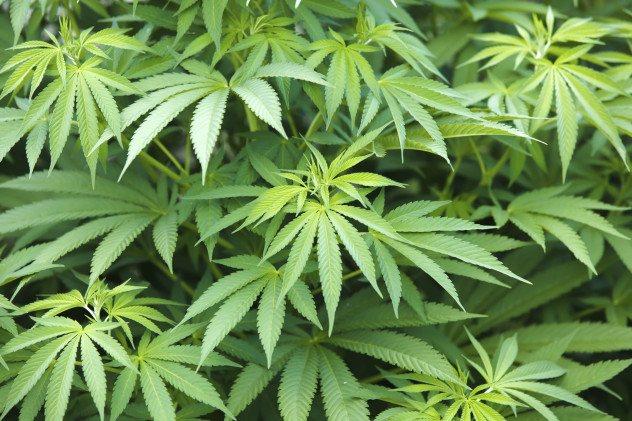
Many people think smoking cannabis is a completely victimless crime. When someone lights up a joint, they figure the only thing they might be hurting is their own lungs. Unfortunately, if you live in the UK, you may be supporting the enslavement of countless Vietnamese children every time you toke up. A special called Children of the Cannabis Trade seeks to highlight this growing problem in the UK.
Many traffickers start by manipulating poor people back home in Vietnam. The traffickers can manipulate poor parents into letting their kids be taken to the UK for “a better life.” The idea is that the person will owe the trafficker a specific amount of money—usually thousands of dollars—for taking them to another country. Typically, this is an amount they are never meant to be able to pay off. The slave cannot complain to the authorities in their new country since they will likely be deported in the best-case scenario. And, if they don’t comply, the traffickers can threaten to hurt their families. It is a very effective way to control people.
To make matters worse, the illegal cannabis industry in the UK is growing and is mainly run by the Vietnamese traffickers. Even in the cases where it isn’t, the labor is still usually performed by child slaves from Vietnam. When the police raid these operations, the children are treated like criminals instead of being given amnesty and proper treatment.
Most of the children that are subsequently released end up disappearing, and many believe they are going right back into the hands of other traffickers to continue farming cannabis for their owners in the UK. Some believe that many of these children are voluntarily going back to the men who treat them like cattle not because they want to but for fear of what will be done to their families back home.
7Clothing
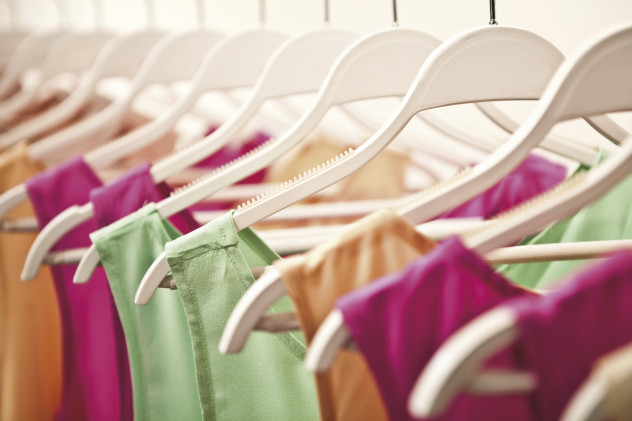
If you’ve ever bought a cheap article of clothing at Walmart or many other retailers, there is a decent chance it was created in a sweatshop. And, more than likely, that sweatshop was located in Bangladesh. Bangladesh has a huge problem with clothing sweatshops and it’s one that isn’t likely to go away anytime soon. It has become such an entrenched part of the local economy that, despite efforts by the government and retailers, it has proven difficult to make much of a difference. While it is illegal to employ children at the factories, many secret investigations have shown that child labor is still alarmingly common in the sweatshops.
To make matters worse, some of the factories in the area that produce clothing for the Western world will claim to have better conditions and generally not be such a nightmarish hellhole. Unfortunately, some Western companies try to get around charges of using child or slave labor by using this as a loophole.
They use these “better factories,” which then secretly pay sweatshops to do a lot of the more labor-intensive parts of the clothing assembly, and the consumer never knows. It works nicely as a shield to protect them from blame while many desperate people who feel they have no other option for work—including children—labor under slave-like conditions for their profit. And, while it may not necessarily seem like official slavery, many of the factory owners seem to think of their workers as little more than expendable property.
In 2014, there was a factory fire in Bangladesh. The management and owners told the employees it was just a drill. They then locked the doors from the outside and well over 100 people died. It seems that the potential scrutiny from all of those people rushing out of the building worried them more than those people’s safety. The year before, there was a building collapse which killed over 1,000 people. Many were outraged at the callous way these sweatshop owners treated human lives, and the incident caused Disney to pull out of the country. However, not one to ever miss a bargain, Walmart still sources its clothing from sweatshops located within Bangladesh.
6Rubber
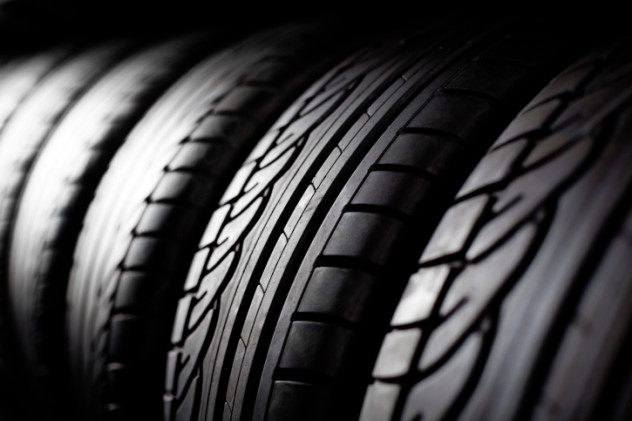
Believe it or not, in Liberia, rubber is actually by far their most important commodity. It is sourced from rubber plantations where it is extracted from trees and put into buckets. This latex-like liquid is later further processed into all kinds of rubber stuff we use every day, like the tires for our cars. The process itself is environmentally sustainable if done right and can be a significant moneymaker—truly, it’s a great boon for Liberia’s economy.
Unfortunately, many of the people who are looking to take advantage of it view human beings the same way they view rubber—as nothing more than a resource. Back in 2006, there was a major problem when two big rubber plantations were in the hands of former combatants from Liberia’s incredibly divisive and destructive civil war. And, according to investigations, these plantations were treating their workers like slaves.
The major tire manufacturer Firestone was accused of buying from these plantations against the wishes of the Liberian government. While Firestone denied the charge, an official from the company also admitted that he couldn’t be sure if any rubber was purchased from a particular site. While this may seem like corporate weasel speak, he may not have actually known for sure. The rubber industry in Liberia is poorly regulated and the commodity is not well-tracked. Firestone may not have necessarily even known who they were buying from, which just makes the matter worse—even a well-meaning company could end up buying slave-harvested resources if there isn’t a proper system in place to check which plantation the rubber came from.
5Palm Oil
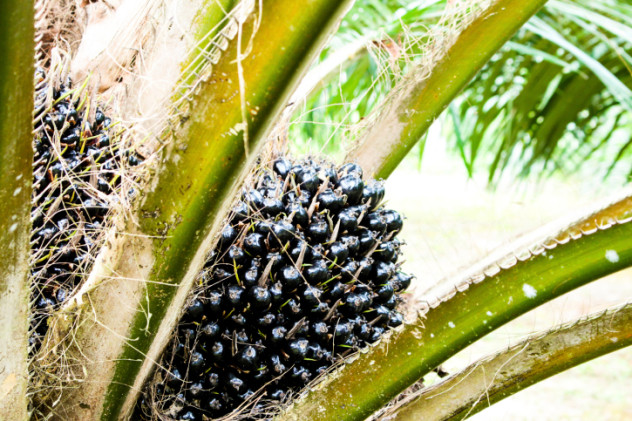
Palm oil is increasingly used in Asian countries as a cheap cooking oil, but it also has applications throughout the entire spectrum, from cosmetic products to fuel. Now, some people are concerned about the use of palm oil in general, but mostly this is due to the fact that it is often environmentally destructive.
Sadly, there is a much bigger reason for those with scruples to avoid palm oil—the industry is largely built on slave labor and massive exploitation. The entire industry is worth over $40 billion a year, and a large amount of the production that drives the industry occurs on two islands in Indonesia—Borneo and North Sumatra.
The industry’s backing of slave labor is due to large companies like Kuala Lumpur Kepong (KLK), a Malaysian company operating in Indonesia, that has over 70 plantations on the islands. When it comes to finding labor for farming the plants necessary to make the oil, there is very little in the way of direct hiring. Instead, the work is contracted to outside companies.
Unfortunately, this leaves very little oversight, and the contracting companies have been accused of many awful practices by slaves who escaped the farms. The contractors tend to take people far from their homes promising jobs that are at least minimum wage and then, when they arrive, they completely change their tune. The men are forced to sign contracts that give them over to years of work service, are loaned money instead of being paid, have to buy everything at a company store, and are beaten if they ever try to leave. Young men, thinking they are heading to work hard at a paying job, find themselves slaving away for wages that may never come and can do nothing to escape their fate.
When KLK came under fire for the abuse, they fired a specific contractor who was found to engage in these practices, but subsequent investigations by Businessweek found that many of the same abusive practices are continuing. KLK attempts a sort of plausible deniability by claiming that they cannot control what their contractors do. They then stop doing business with them when they learn of such labor abuses. In order to prevent further abuses, KLK has suggested they may attempt more direct hiring of laborers in the future. However, this does not do much good for those who have already been abused and those who are still being abused to this day.
4Knockoff Handbags
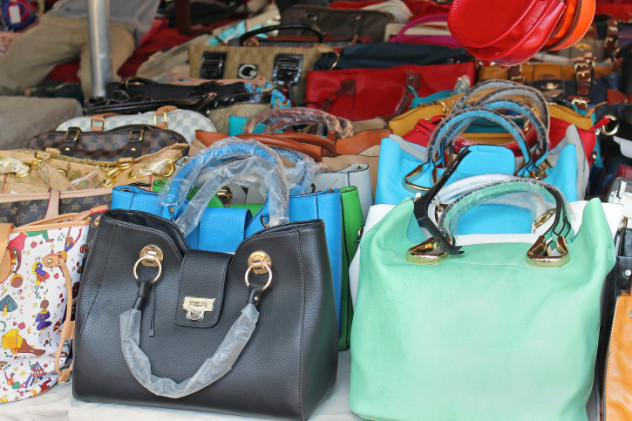
The industry that produces counterfeit handbags and other similar knockoff items is easily a multibillion-dollar global business, according to Dana Thomas, the author of Deluxe: How Luxury Lost Its Luster. While Thomas spends a great deal of time investigating the counterfeit culture of handbags and other designer goods, she has also investigated the world counterfeit market as a whole and estimates it is worth about $600 billion.
According to her investigations it also has led to the loss of well over 500,000 jobs in the US alone. This trade is known for using mostly slave labor, often children, and the profits are often used to support all kinds of criminal ventures.
She has had multiple occasions where she went with the police on raids and saw dozens of horribly treated little children. Their plight made her feel awful. The most awful story occurred in Thailand, where she was once again accompanying the police on a raid to get a feel for just what was actually going on in the counterfeit handbag industry.
The factory “employed” several small children who were diligently working to make fake designer handbags for Western consumers. The owners of the factory had actually broken the children’s legs and then, so the children’s legs would never properly heal or work again, they tied them to their thighs. The police informed Thomas that the owners had tired of the children complaining of wanting to play outside and decided that the best way to deal with the situation was to make sure they would never walk again.
For those who still aren’t convinced to stop buying counterfeit goods because of the horrible treatment of the slave children who make them, authorities have also explained that many counterfeit goods can also be dangerous to the user. They are made without proper quality controls and the idea that anyone is testing them for product safety is laughable. Law enforcement in Canada has explained that, for example, designer sunglasses have been known to cut the wearer or offer false claims about UV protection that could end up causing eye damage.
3Diamonds

Zimbabwe has been in the news a lot during the past few years and not for anything good. Known for the dictatorial rule of Robert Mugabe and his often violent army—and even more violent supporters—the country has had a tumultuous time lately. In a highly contested election, Morgan Tsvangirai ended up as prime minister, but Mugabe was still president. The two parties entered into a power sharing agreement.
The country’s entire economy was already in tatters from hyper-inflation, and things were quickly becoming chaotic and out of control. Many people hoped that the new unity government could possibly heal some of the wounds and bring a relative sense of peace and prosperity back to the region.
Unfortunately, the government of Robert Mugabe and his Zanu-PF party had other plans. Before things could truly get started with the new government, it was already clear Mugabe had no idea what power sharing even meant. His Zanu-PF party, according to the Human Rights Watch, set up a massive under-the-table diamond mining operation using slave labor that was enforced by the military. The operation led to the slaughter of hundreds in a short period of time.
They claim the slave operation was put in place by Mugabe so he could make money that didn’t go directly through the now-shared government and pay off the soldiers so he could remain truly in control. Unfortunately, it shows that many rulers care far more about power than they do about the well-being of their people and will even enslave them if need be.
2Pornography

When most people think of human trafficking, they usually think of sexual slavery. This is normally a correct assumption, as the majority of trafficking is for this purpose. However, when most people think of sexual slavery, they are thinking of people who are being forced to perform sex acts in brothels.
Rarely do people think that many pornographic films and pictures, especially coming from dubious countries of origin, may involve women who were sold into slavery years ago. According to scholarship on the subject of human trafficking, there have been several “waves” of trafficking in recent decades. The first was Thai and Filipina women, then Colombian and Dominican, then Nigerian, and now investigators say that the majority of women being exploited for sexual slavery are being taken from the Soviet Union.
Those who have investigated say that these Slavic women are in high demand in the Western world and are used not just for prostitution but also for pornography. Since the trade is illegal, it is hard to come up with actual numbers, but estimates usually put the number of people sold yearly in the millions with another estimated 80 percent of those people being used for sexual purposes.
With the way trafficking has moved slaves to every country in the world, it’s hard to estimate how many amateur-made pornographic films feature sex slaves. Unfortunately, the number may be very high. As with anything illegal, it’s hard to track.
1Shrimp
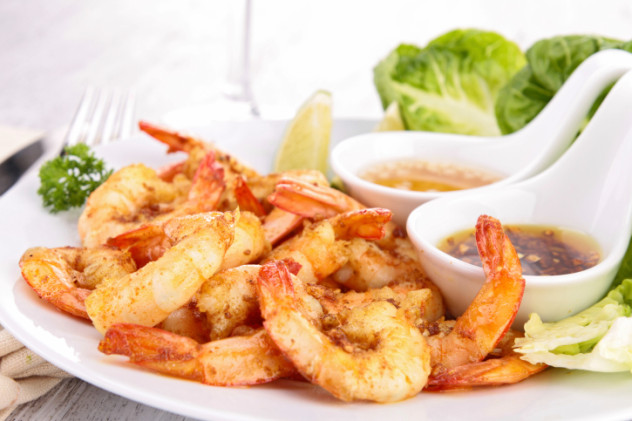
A recent investigative report by The Guardian found a massive slavery problem in the global prawn (or shrimp) industry. To make a long story short, they found problems with a major prawn farmer based in Thailand known as CP Foods. CP Foods supplies prawns to several huge companies all over the world, including our old friend Walmart, and also Tesco, Costco, and Carrefour.
This company is not actually specifically employing slave labor itself or even sourcing its prawns from those who do. It’s actually a much more subtle problem at the base of their supply line which is why it took The Guardian so much digging to find. The problem is that all of the fish meal CP Foods buys can be traced back to dealers who employ slave labor on their fishing boats.
These dealers trawl the ocean for the reject fish that they can turn into meal and sell to big companies. In order to meet margins, they employ countless slaves to do the work for them. In Thailand, many migrant workers are trying to find employment and get the help of brokers to get jobs. However, instead of getting them work, the brokers sell them to the fish meal dealers. The slaves are kept on the boats, sometimes in chains, and are often beaten if they do not perform well—sometimes they are beaten anyway just for good measure.
Despite trying to fix the problem in the face of threats from the US to downgrade their trading status, Thailand is easily one of the biggest names in human trafficking in the world. Some people feel that if the government were to step in and work as brokers for those wishing to find work that the slavers would no longer be able to continue their practices, but that the government is not bothering to do anything serious about it for economic reasons. Some think that the profit margins aren’t high enough for Thailand’s prawn industry to survive without the massive use of slave labor on fishing boats. On the other hand, considering the possible ramifications in international trade for being so highly linked to human trafficking, Thailand will likely want to do something about the problem soon.








